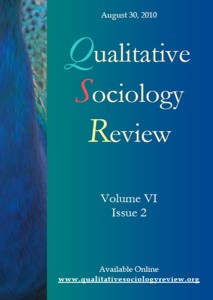Secondary Adjustment in Prisons: Prisoners’ Strategies of Influence
DOI:
https://doi.org/10.18778/1733-8077.6.2.08Keywords:
Secondary adjustment, Influencing Strategies, Covert Participant Observation, Grounded TheoryAbstract
This participant observation research explores and examines the strategies that prisoners use to influence prison officers in an Asian prison setting. Grounded theory methodology is employed in the analysis process. From the study, eight strategies of influence are conceptualised: repetition, distraction, finding excuses, feigning ignorance, false compliance, hearsay, direct hit and spontaneous protest. They are further subsumed under three main categories of Enhancers, Trouble Shooters and Resistors. On the other hand, there are three categories of prison officers with respect to their responses to the eight strategies of influence – Idealists, Pragmatists and Authoritarians. In summary, this study serves three objectives. First, it provides a fresh perspective on how prisoners attempt to influence prison officers in their daily interactions. Second, it has demonstrated that data collection through covert participant observation can be done effectively without causing any harm to the stakeholders in a prison setting. Lastly, this study has implications for the development of theory, practice and future research in the area of penology.
Downloads
References
Glaser, B. (1978) Theoretical sensitivity. Mill Valley, CA: The Sociology Press.
Google Scholar
Glaser, B. G. and A. Strauss (1967) The discovery of grounded theory. Chicago: Aldine.
Google Scholar
Glaser, B. G. (1992) Basics of grounded theory analysis: Emergence versus forcing. Mill Valley, CA: Sociology Press.
Google Scholar
Goffman, E. (1961) Asylums: Essays on the social situation of mental patients and other inmates. Garden City, NY: Anchor.
Google Scholar
Finlay, L. (2002) "Pearls, pith and provocation. ‘Outing’ the researcher: the provenance, process and practice of reflexivity." Qualitative Health Research 12(4):531-545.
Google Scholar
DOI: https://doi.org/10.1177/104973202129120052
Hamm, M., T. Coupez, F. Hoze, and C. Weinstein. (1994) "The Myth of Humane Imprisonment: A Critical Analysis of Severe Discipline in U.S. Maximum Security Prisons, 1945-1990." Pp 167-200 in Prison Violence in America edited by Braswell, M., Montgomary, R. and Lombardo, L. Cimcinnati: OH. Anderson Publishing.
Google Scholar
Lincoln, Y. and E. Guba (1985) Naturalistic inquiry. Newbury Park, CA: Sage.
Google Scholar
DOI: https://doi.org/10.1016/0147-1767(85)90062-8
Festinger L., H. W. Riecken and S. Schachter (1956) When prophecy fails. New York: Harper & Row.
Google Scholar
DOI: https://doi.org/10.1037/10030-000
Humphreys, L. (1970) Tearoom Trade. London: Duckworth.
Google Scholar
DOI: https://doi.org/10.1007/BF02812336
Parker, J. (1974) View from The Boys: a sociology of down-town adolescents. Newton Abbot: David & Charles.
Google Scholar
Patton, M. Q. (1990) Qualitative Evaluation and Research Methods (2nd ed.). Newbury Park, CA: Sage Publications, Inc.
Google Scholar
Rosenhan, D. (1973) "On being sane in insane places." Science, Vol. 179, 250-258.
Google Scholar
DOI: https://doi.org/10.1126/science.179.4070.250
Scharf, P. (1983) "Empty Bars: Violence and the Crisis of Meaning in Prison." Prison Journal 63(1):114-124.
Google Scholar
DOI: https://doi.org/10.1177/003288558306300111
Strauss, A. and J. Corbin (1998) Basics of qualitative research: Techniques and procedures for developing grounded theory. Thousand Oaks: Sage.
Google Scholar
Sykes, G. (1958) The Society of Captives. Princeton, NJ: Princeton University Press.
Google Scholar
Downloads
Published
How to Cite
Issue
Section
License

This work is licensed under a Creative Commons Attribution-NonCommercial-NoDerivatives 4.0 International License.











